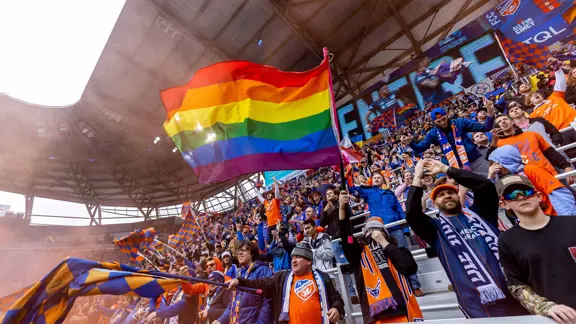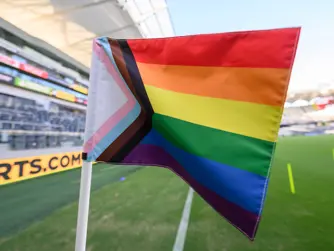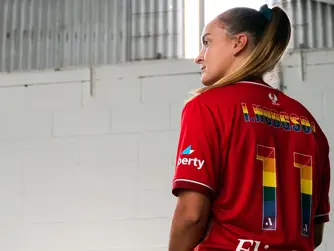News
Pride: Why allyship in football matters

As we celebrate inclusivity in football this Pride, the month is also an opportunity to reflect on allyship – and how players, fans and those working behind the scenes can foster an atmosphere where everyone feels welcome. But what does allyship truly mean?
"Allyship simply means standing in solidarity with people from underrepresented groups. It is an active, consistent and oftentimes very challenging practice of unlearning, re-evaluating and recognising your position of privilege and using it to create space for the voices of underrepresented groups to be heard," explains Hayley Bennett, a Diversity, Equity & Inclusion expert who works closely with FIFPRO's EDI Committee.
The committee plays a critical role in defining, creating, and delivering FIFPRO’s global EDI strategy, supporting FIFPRO member unions through information sharing, collaboration, and strategy to make football more inclusive.
"What form should allyship take in football? For it to be truly effective in bringing about the change we need to see, we must move beyond slogans and branding. We cannot be an ally only when incidents arise; it demands our consistent attention," says Bennett.
Allyship – we all have a role to play in football

"Whilst allyship should be visible, its meaningful practice is introspective: it takes place when nobody is watching. Allies should speak up about every act of abuse but also recognise that discrimination and oppression run through every sphere of our society."
Allyship for players
Speaking to FIFPRO in 2021 shortly after he became the first active openly gay player in men’s top-flight football, Josh Cavallo highlights the importance of allyship, particularly from his Adelaide United team-mates.
The Australian said: "My team-mates were surprised, but just so happy that I had taken that step to being comfortable in my own skin – we hugged, talked for a bit, and then the conversation just slipped back into football, nothing had changed.
"All those times I had stressed about social situations: what if someone asks me who I am dating? How can I make sure they don’t find out? I realised that they were totally unnecessary because these people at Adelaide United – my family away from home – they just want what’s best for me both on and off the pitch. Armed with that knowledge, I walked out of that room with the biggest smile on my face, ready to take on the world.
"By the time it came to pushing the button on my public announcement, I felt like I’d already won the race."
In October 2021, @JoshuaCavallo became the only current openly gay player in men’s top-flight football.
— FIFPRO (@FIFPRO) December 23, 2021
Public reaction was overwhelmingly positive, but how has life been like since?
For the full interview, visit: https://t.co/ym0Z1dvSFl pic.twitter.com/YBRti87Qjf
Solidarity for Cavallo did not just come from his male team-mates at Adelaide United, but also that of the women's side. Speaking about her own experiences as a gay player to FIFPRO, Isabel Hodgson also paid tribute to Cavallo and the importance of creating a safe space for players.
"When Josh came out, I was just so proud and excited for him; you could immediately see the weight that had been lifted from his shoulders, and just how much better he felt in himself," says Hodgson.
"At the same time, I also felt really sad that he has been struggling with this for so long. Football was always my safe space – somewhere I could thrive exactly as I am, and hearing that this sport that we both love to play wasn’t the sanctuary for him that it was for me, was heart-breaking."
Isabel Hodgson: "We want our game to be an accepting, inclusive environment"

Shining a light and speaking up for LGBTQIA+ rights
In the build-up to the 2022 FIFA World Cup in Qatar, Australia international Jackson Irvine was one of three international players who launched the first season of #ShineALight, a FIFPRO series where professional footballers talk about social and industry topics that matter to them.
Irvine talked with conviction about promoting LGBTQIA+ rights in football. He said: "I have family and friends who are part of the LGBTQIA+ community – a group of people who, for a long time, have been massively marginalised and discriminated against. I want to speak up for them.
"Let’s be clear here: homophobia in football is still a problem. There are a lot of issues facing sport and football in general – and I think any kind of toxic masculine atmosphere, which football unfortunately has sometimes, doesn’t make people from the gay community feel welcome and part of the game.
"We, as players, have a big role to play. Education and making information available to those in football is going to play a massively important part, as is us speaking up."
What members of FIFPRO’s EDI Committee say
Simone Pound, PFA's Director of Equality Diversity and Inclusion, said: "Pride Month is an important time to recognise the contributions made by LGBTQ+ footballers and athletes around the world. Aligned in allyship and advocacy with our partners across our sport, we’re proud to celebrate Pride Month and amplify the message that football is a game for all."
Camila Garcia, Director and founder of Chilean women’s player association ANJUFF, said: "For us, it is a daily task to represent football players from all over the world—different countries, cultures, genders, races, and sexual orientations. This diversity is our core strength. With this in mind, it is our duty to foster inclusivity, not only enhancing our beautiful game but also promoting a culture of respect and equality that transcends the pitch."
